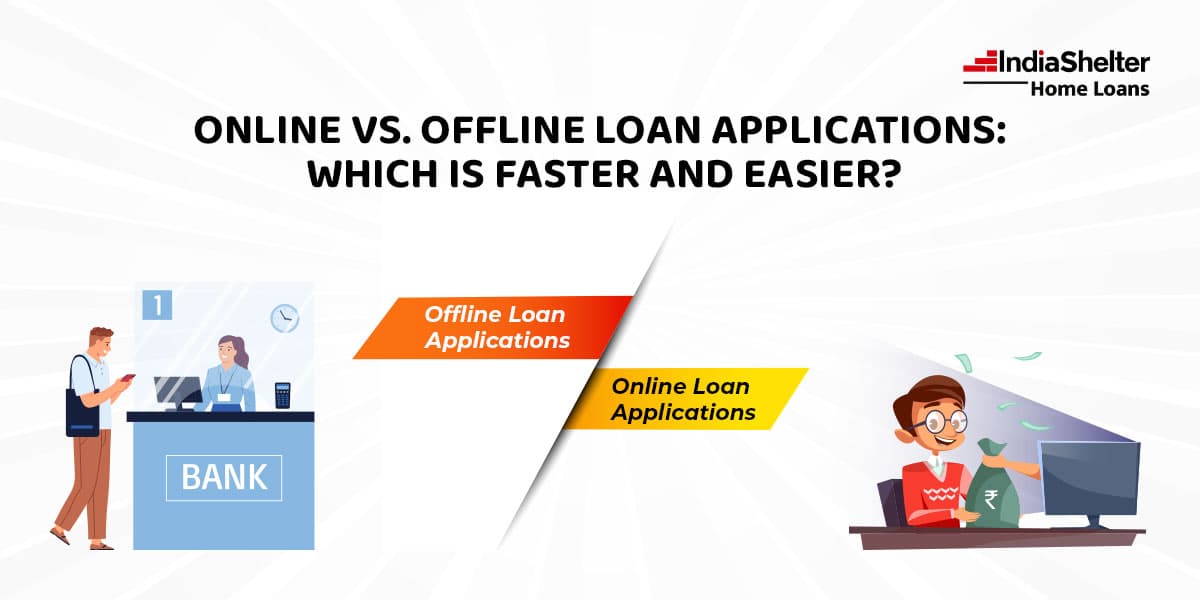What Is the Difference Between Banks and Housing Finance Company?

Published on :2024-12-31
In the purview of the growing demand for home loans, several financial organizations in India offer different kinds of housing loan solutions to suit the exact needs of the borrowers. As a home buyer, you can compare the loan offers of different lenders and turn to either a bank or a housing finance company (HFC) and get the desired amount.
In this guide, we discuss the difference between these types of financial organizations and which one to choose.
What is a housing finance company?
A Housing Finance Company is an unregulated financial body regulated and governed by the Companies Act of 1956 and the RBI (Reserve Bank of India). It was created mainly to help people buy a home by offering a theme home loan. Its presence also eases the burden on regular banks and gives potential home loan borrowers more loan options.
Pros and cons of applying for a home loan with a housing finance company
In 2019, the RBI introduced new regulations for HFCs, which made them function like NBFCs (non-banking financial companies). Since then, many people in India trust HFCs to get a home loan. Let us look at the benefits and drawbacks of getting a home loan from HFCs.
Pros
- Get a higher loan amount
One of the most significant benefits of applying for a home loan is that you can get sanctioned for a higher loan amount as compared to banks. This is mainly because the HFCs include registration fees, stamp duty, and other related charges when they evaluate the value of the property you want to purchase.
- Flexibility with credit score requirements
As compared to banks, the HFCs in India are more flexible with their eligibility requirements for the home loan, regarding credit score criteria. This is why many people who have a low credit score of 700 or less prefer applying for a home loan with an HFC.
- Simple loan approval process
Today, most home loan borrowers prefer applying for a loan with lenders that have a simple application and approval process and the ones that offer online application facilities. This is exactly what HFCs offer. Also, HFCs have a minimal documentation process. This means you need not have to deal with complex paperwork to get the loan approved.
- Home loan for all
Generally, housing finance companies have a more open approach towards who can avail of a home loan. Whether you are a self-employed individual, a start-up owner, an artist, or a freelancer with no fixed income source, you can get a home loan.
Cons
- High interest rate
One of the most important drawbacks of borrowing a home loan from an HFC is that they charge a higher interest rate. This eventually leads to higher EMIs, and you may find it challenging to make the monthly payments.
- Fewer HFCs
As compared to banks, there are fewer HFCs and their branches. This can make it difficult for you to find the best HFCs that are offering the loan at an affordable interest rate and favorable terms and conditions to suit your needs.
- Higher processing fees
All home loan lenders levy a processing fee, and the HFCs charge more than the banks. This will increase your overall borrowing cost.
Pros and cons of applying for a home loan with a bank
In India, there are many banks, both private and public sector banks that offer different housing loan solutions to potential home buyers, apart from offering them a range of banking services. Some of the banks have a wide presence and branches all over the country, allowing you to apply for a loan no matter where you are located.
Pros
- Competitive interest rates
Generally, the interest rate levied by the banks on home loans are extremely competitive and a few points lower than the interest charges by HFCs. This allows you to get the desired funds and manage the repayment easily without feeling any financial burden.
- Banks have to abide by the MCLR rule
As per the RBI mandate, all banks in India (except co-operative banks) must follow the MCLR (Marginal Cost of funds-based Lending Rate) rule and must link home loans to it. If there is any change in the repo rates announced by the RBI, the banks would have to adjust the home loan interest rate. So, if there is a drop in the repo rate, you can benefit from lower interest rates on your home loan.
- Tie-ups with real estate builders
Another significant advantage of taking a bank loan to buy your dream home is that several banks have tie-ups with many leading real estate developers. This means if you purchase a property built by one of these developers, you may have a special deal on your home loan. This can significantly help you save money on your interest payments, or you may get the loan with more favourable terms and conditions to suit your exact needs.
Cons
- Banks have stringent policies about who they want to offer the loan to and strict eligibility criteria.
- Banks also require a high CIBIL score, which can make it difficult for some to get a loan.
So, what should you choose for a home loan – bank or HFC?
In recent years, the HFCs in India have made remarkable progress in terms of their loan products and services, making them a preferred choice for borrowers looking to get a home loan. On the other hand, if you have an existing relationship with the bank and meet their eligibility criteria, you can consider applying for a home loan with the bank as the interest rates are low.
Whether you choose a bank or an HFC is entirely your personal choice. Make sure that you choose a reputed lender to enjoy a hassle-free borrowing experience.
To apply at India Shelter, visit https://agile.indiashelter.in/ or call us on 1800-572-8888 or drop a missed call at 7065515122 .
Related Blogs

2025-04-14
Surprising Budget Changes That Will Impact Your Wallet
Explore major budget shifts affecting savings, loans, and expenses. Stay ahead with insights on financial changes that could impact your wallet this year.

2025-04-14
Online vs. Offline Loan Applications: Which is Faster and Easier?
Discover the key differences between online and offline loan applications. Learn about their benefits, processes, and choose the right option for your needs.

2025-04-10
Common Tax Filing Mistakes That Could Cost You a Fortune
Learn about common tax filing mistakes that can cost you money. Avoid errors, maximize deductions, and ensure a smooth tax filing process with these tips.
Disclaimer: *By contacting IndiaShelter on Toll Free/WhatsApp/Website or any other mode, you authorize our representatives to reach out to you through personal communication via SMS, WhatsApp and phone calls regarding our services. This consent will supersede any registration for any Do Not Call (DNC) / National Do Not Call (NDNC).
© India Shelter Finance Corporation 2024 | All rights reserved
Design with byCyberworx





